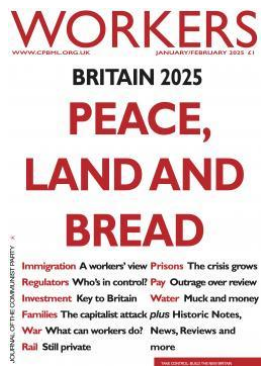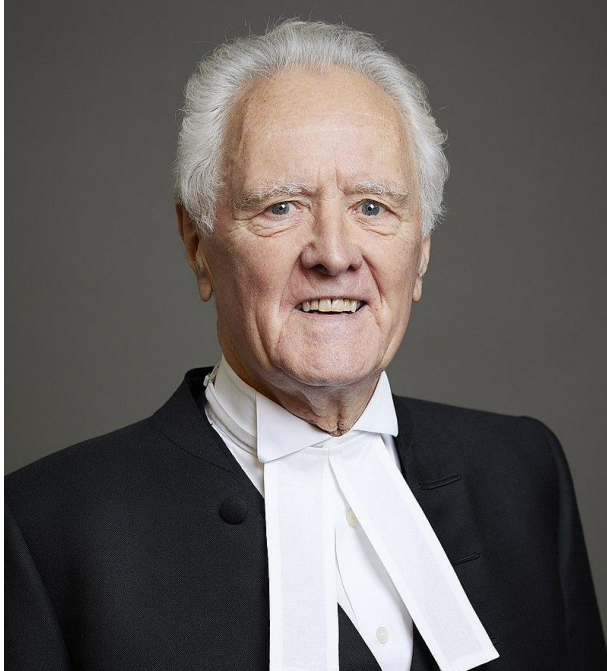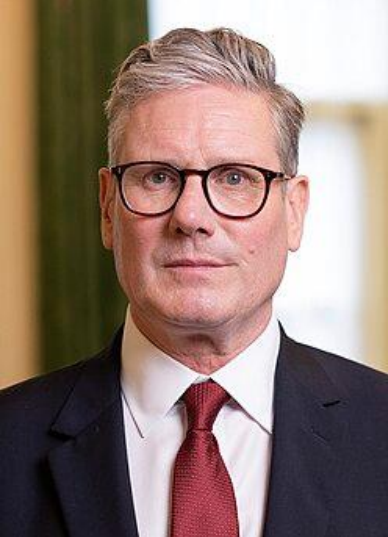.
IT’S WELL KNOWN that the National Liberal Party has a long-standing policy of looking at a diverse range of opinions that might be of interest to our readers.
This involves printing articles from right across the political spectrum. Many of these articles come from unlikely sources. And this is particularly so of this article which comes from the January/February 2025 issue of Workers, the journal of the Communist Party of Britain (Marxist-Leninist).
The CPB(ML) are completely different from other ‘leftist’ organisations that we’ve come across. For a start, they note that they ‘are not “left” or “right”’ & they ‘don’t divide our class into progressives and reactionaries’. This is interesting as groups like the Socialist Workers Party (SWP) just seem to want to ‘smash’ all those they regard as ‘reactionaries’.
The CPBML also want to talk about immigration in a calm & sane way. Contrast this to the SWP position of insulting workers – by accusing them of islamophobia, racism & so on – without listening to their genuine concerns about mass immigration.
With the above in mind, we’ve reprinted an article (about immigration) from their January/February 2025 issue of Workers. We think that readers will find it balanced, nuanced & very thought-provoking. You can find the original article here:
It goes without saying that there are no links between the CPBML, Workers and the National Liberal Party.
.
It is a precious thing when workers are able to talk to one another – and listen to the ideas of others. Nowhere is this discussion more needed than over the movement of labour across borders …
.
Immigration: How Workers Can Respond
.

The January/February 2025 issue of Workers, the magazine of the Communist Party of Britain (Marxist-Leninist). It contains an excellent article on immigration. The magazine itself is balanced, nuanced & very thought-provoking. And the CPB(ML) are completely different from other ‘leftist’ organisations that we’ve come across.
Picture Credit: https://www.cpbml.org.uk
IT IS a precious thing when workers are able to talk to one another, and more importantly listen to the ideas of others, and understand the issues faced by workers in other industries and regions.
.
Open dialogue has never been more needed than in dealing with the issue of immigration, but is routinely suppressed for fear of the label “racist” – usually unfounded. Only through this discussion can our class build the unity and strength to exercise control.
.
The working class knows this issue is important but is frustrated in clarifying its real cause and impact, and in formulating an appropriate response.
.
We have first to understand the drivers of mass immigration in today’s capitalist Britain; secondly, we have to identify the impact that it has on the country and its working class; and finally, we must determine how we should respond.
.
No doubt every British worker has at some time been grateful to a migrant worker for a service they have received. For instance, it would be almost impossible in most parts of the health service not to be cared for by a member of staff who is either from a recent migrant background, or is a first-generation migrant.
.
ATTACK ON WAGES
.
At the same time workers can recognise that mass immigration is used as a means to attack the working class through the lowering of wages and deskilling, and impacts on other areas, such as housing and public services. So our first question is, Why has immigration increased to such high levels? What are the drivers?
.
Net mass immigration took off with the election of the Labour government in 1997. It was 48,000 but rose extremely rapidly, almost trebling in one year to 140,000 in 1998; it was not to fall below 100,000 again. Between 1997 and 2010, the “New Labour” years, net migration averaged 200,000 per year, five times higher than under the Conservative Major government of 1990-1996.
.
It is now clear that overall foreign immigration between 1997 and 2010 was 3.6 million, while nearly a million British citizens emigrated giving total net migration of 2.6 million (
https://www.migrationwatchuk.org/briefing-paper/355). A further boost happened when the Labour government introduced unrestricted immigration from the EU in 2004.
.
In 2015 net immigration was 330,000 a year, the vast majority EU citizens from Eastern Europe. This more than doubled in 2022, to 764,000. These were no longer EU nationals but came mainly from Asia and Africa. The year to June 2023 was higher still, last November revised up to 906,000 (
https://www.bbc.co.uk/news/articles/c3degx4029ko). That is an astonishing one and a half million added to our population in just two years.
.
What then are the arguments given to support this mass immigration? “There are too few workers to do the work needed.” It is true that Britain is in desperate need of workers doing the work we need doing. But capitalism chooses not to use this valuable resource available here.
.
NEVER CHEAP ENOUGH
.
The cheapness of labour promoted through immigration encourages capitalism to use labour in the most marginal of activities. No matter what the level of immigration, it will not satisfy the thirst of capital to seize the chance to use cheap labour requiring little investment and minimum risk. The hunger for this labour will never be satisfied.
.
The impact of mass immigration is the creation of an available pool of cheap labour which then suppresses the wages of all workers. It results in the plunder of talent from around the world – a new form of imperialism.
.
Globalisation means the free movement of labour, and of capital, and capital now views the whole world as its “reserve army of labour”, a concept that Karl Marx identified as an essential feature of capitalism.
.
Those who might think that they should leave their own countries should instead stay and fight for their countries’ own independence, and build socialism at home. The solution is not to desert their own countries and become rootless victims of capitalism.
.
Labour power is a commodity traded like any other. In effect Job Centres no longer need to be in Brixton and Liverpool to have the required impact – they can just as well be in Bangalore and Lagos.
Since 2020 when EU workers could no longer move freely to work in Britain, the number of work visas issued has exploded from 80,000 to 340,000 a year. The health and care sectors, by far the largest group of workers, have seen the biggest increase – 135 per cent last year.
.
How often do we hear that we need immigration to fill the skills shortage? There is no skills shortage other than that deliberately created by capitalism. Unable and unwilling to invest in skill, capitalism prefers to import skills from abroad, denying yet another generation the skills we need to rebuild Britain.
.
Another argument is that we need immigration to expand our economy. Recently, when immigration has been at its highest, the limited increase in GDP has been due to mass immigration expanding the population, not from any economic improvement. There is no improvement in productivity, rather a stagnating share of GDP per worker.
.
PROFITS
.
Immigration has encouraged capital to avoid investment and innovation, while still increasing its profits. Instead of economic improvements, we see a race to the bottom of low wages and low skill.
.
This is a desperate attempt to delay capitalism’s terminal decline, but in the end is no solution at all. Such short termism and lack of forward planning produce an increasingly unsustainable economy that will eventually collapse under its own contradictions into another financial crisis.
.
How then should the working class respond?
.
Firstly, by talking about it. So concerned are the ruling class and their allies at the strength of the evidence that they are trying to silence legitimate discussion amongst workers, dismissing genuinely held concerns as racism, bigotry and xenophobia.
.
This reached a peak during the Brexit debate, but the tactic failed, as it was bound to, when a confident working class holds its ground. The lies and abuse just strengthened workers’ resolve.
.
Riots last summer after the murder of three children in Southport, Merseyside have not made things easier. The actions of a few have been used to damn the legitimate criticisms made by many workers about the impact of mass immigration.
.
There has been an unholy alliance between those who call for the free movement of labour and those who call for mass deportation. Both undermine the security of people living here. Both sow confusion and disarray to stifle the clear voicing of legitimate concerns about mass immigration.
.
POSTURING
.
Posturing by successive governments over reducing immigration is purely for show. Their abuse of the Skilled Worker Visa system shows that they do not want to take control. Well, if the ruling class won’t take control, who will? In the end it can only be workers.
.
What are our trade unions doing about mass immigration? For the most part, not much. Although they may pay lip service to the issues of pay and training, they are frightened to tackle the related issue of immigration. For example, the TUC General Council at this year’s congress, in its statement on racism and the ‘far right‘ –
https://congress.tuc.org.uk/2024-general-council-statements/#sthash.XBARRBkd.dpbs – failed to address workers’ very real concerns.
.
The class knows that this is something that needs to be dealt with and will talk about it one way or the other. When a confident working class frames its opposition to mass immigration as a fight for our jobs, for wages and for skills to rebuild Britain, it stands on solid ground and others will have to take note.





































